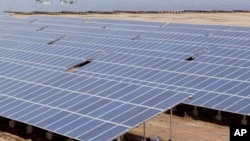JUBA, SOUTH SUDAN —
Central Equatoria state authorities have signed a memorandum of agreement with California technology start-up PV Tech Inc to build a hybrid solar-combustion power plant near the South Sudanese capital.
State Minister for Physical Infrastructure Samuel Suba signed the memorandum last week with PV Tech Inc.
"In a country where most on-grid and off-grid electricity is provided by diesel generators, this new capacity will be a more stable and cheaper alternative," PV Tech said in a statement.
According to the World Bank, less then one percent of South Sudanese have access to electricity. What power they do have tends to come from diesel generators.
Rajaf Payam, about three kilometers (1.8 miles) outside Juba, is being eyed as a potential site for the solar plant.
The plant is expected to start by producing 20 megawatts of power for Juba.
Suba said there was a possibility that it would ramp up gradually to 150 megawatts, which would be enough to meet all of Juba's electricity needs.
The plant is also expected to generate nearly 300 jobs, and if everything goes to plan, PV Tech is expected to break ground on the project next month.
Juba has not had state-provided power since oil production stopped early last year amid a dispute with Khartoum over the transit fees Sudan was charging to carry South Sudanese crude through northern pipelines to export terminals.
Deputy Governor Manasseh Lomole Waya welcomed the new plant at the signing ceremony, but said the state is still looking at developing other sources of power, such as hydroelectricity, to allow rural areas of Central Equatoria to be electrified, too.
During a regional conference last month on the use of the Nile River for hydroelectric projects, South Sudan’s Minister of Irrigation and Water Resources, Mayom Akech, announced that Juba had selected 16 sites along the Nile River to develop dams to be used for hydroelectric power. Lomole said investors are still being sought for those projects.
State Minister for Physical Infrastructure Samuel Suba signed the memorandum last week with PV Tech Inc.
"In a country where most on-grid and off-grid electricity is provided by diesel generators, this new capacity will be a more stable and cheaper alternative," PV Tech said in a statement.
According to the World Bank, less then one percent of South Sudanese have access to electricity. What power they do have tends to come from diesel generators.
Rajaf Payam, about three kilometers (1.8 miles) outside Juba, is being eyed as a potential site for the solar plant.
The plant is expected to start by producing 20 megawatts of power for Juba.
Suba said there was a possibility that it would ramp up gradually to 150 megawatts, which would be enough to meet all of Juba's electricity needs.
The plant is also expected to generate nearly 300 jobs, and if everything goes to plan, PV Tech is expected to break ground on the project next month.
Juba has not had state-provided power since oil production stopped early last year amid a dispute with Khartoum over the transit fees Sudan was charging to carry South Sudanese crude through northern pipelines to export terminals.
Deputy Governor Manasseh Lomole Waya welcomed the new plant at the signing ceremony, but said the state is still looking at developing other sources of power, such as hydroelectricity, to allow rural areas of Central Equatoria to be electrified, too.
During a regional conference last month on the use of the Nile River for hydroelectric projects, South Sudan’s Minister of Irrigation and Water Resources, Mayom Akech, announced that Juba had selected 16 sites along the Nile River to develop dams to be used for hydroelectric power. Lomole said investors are still being sought for those projects.




